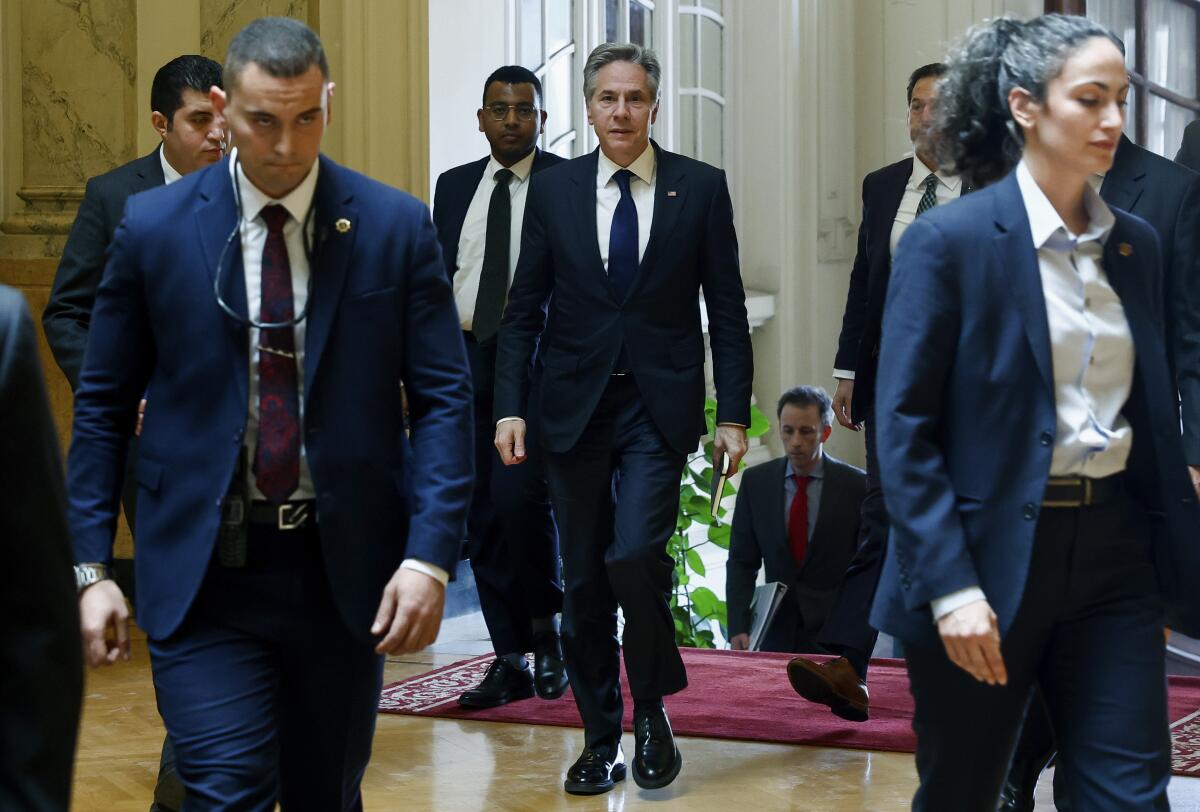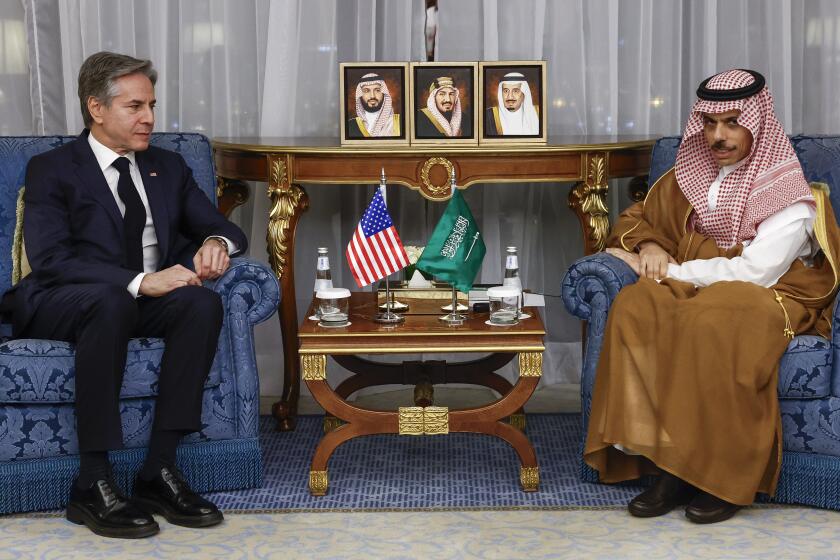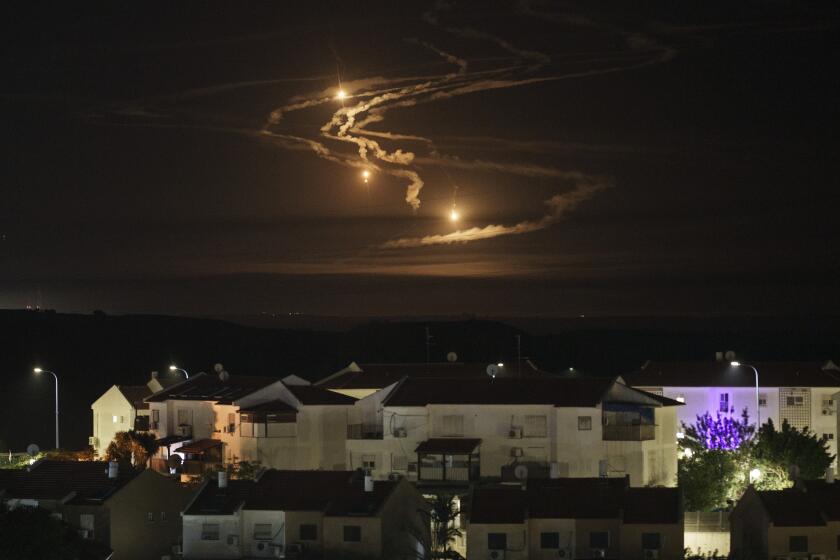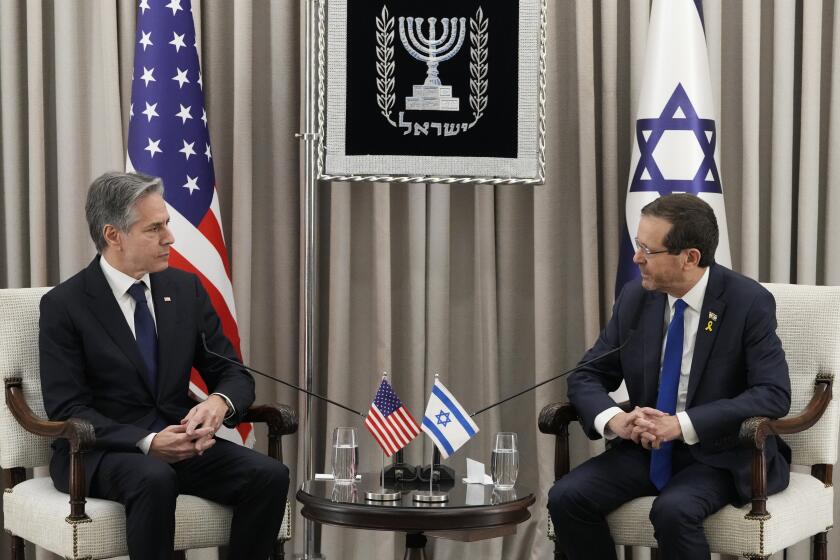Blinken says Israeli assault on Rafah would be a ‘mistake’ and isn’t needed to defeat Hamas

- Share via
CAIRO — U.S. Secretary of State Antony J. Blinken said Thursday that a major Israeli ground assault on the southern Gaza town of Rafah would be “a mistake” and “unnecessary” to defeating Hamas, underscoring the further souring of relations between the United States and Israel.
Blinken, on his sixth urgent Mideast mission since the war began in October, spoke after huddling with top Arab diplomats in Cairo for discussions over efforts for a cease-fire and over ideas for Gaza’s post-conflict future. He said that an “immediate, sustained cease-fire” with the release of Israeli hostages held by Hamas was urgently needed and that gaps were narrowing in indirect negotiations that U.S., Egypt and Qatar have spent weeks mediating. Those negotiations are to continue at a senior level in Qatar on Friday.
Blinken heads to Israel on Friday to meet with Prime Minister Benjamin Netanyahu and his war Cabinet. The growing disagreements between Netanyahu and President Biden over the prosecution of the war will probably overshadow those talks — particularly over Netanyahu’s determination to launch a ground assault on Rafah, where more than a million Palestinians have sought refuge from a devastating Israeli ground and air offensive farther north.
U.S. Secretary of State Antony J. Blinken will travel to Israel this week as part of his sixth urgent mission to the Middle East.
Netanyahu has said that without an invasion of Rafah, Israel can’t achieve its goal of destroying Hamas after its deadly Oct. 7 attack and taking of hostages that triggered Israel’s military campaign in the Gaza Strip.
“A major military operation in Rafah would be a mistake, something we don’t support. And, it’s also not necessary to deal with Hamas, which is necessary,” Blinken said at a news conference in Cairo with Egyptian Foreign Minister Sameh Shoukry.
A major offensive would mean more civilian deaths and worsen Gaza’s humanitarian crisis, Blinken said, adding that his talks in Israel on Friday regarding Rafah and discussions between senior U.S. and Israeli officials next week in Washington will explore ideas for alternative action.
The U.S. position on a Rafah operation has shifted significantly in recent days. Initially, U.S. officials said they could not support a major incursion into the city unless there was a clear and credible plan for getting civilians out of harm’s way. Now, U.S. officials say they have concluded that there is no credible way to do that given the population density of more than a million people. They say now that other options, including specifically targeted operations against known Hamas fighters and commanders, are the only way to avert a civilian catastrophe.
But Netanyahu, on a roughly 45-minute call with GOP senators on Wednesday, pledged to ignore warnings about a Rafah operation. He also took aim at Senate Majority Leader Charles E. Schumer’s condemnation last week of the civilian death toll in Gaza and his call for new elections in Israel in a speech that Biden later said was “good.”
U.S. Secretary of State Antony J. Blinken is holding talks in Israel as he seeks a plan for Gaza’s postwar future even as the fighting continues.
Netanyahu stressed that Israel would proceed in Rafah, according to senators who participated in the meeting. Sen. John Kennedy, a Louisiana Republican, said Netanyahu “made it very clear that he and the people of Israel intend to prosecute the war to the full extent of their power and that he would not be dictated to by Sen. Schumer or President Biden.”
Israeli critics have accused Netanyahu of undermining bipartisan American support by cultivating close ties with Republican leaders.
As Blinken and the Arab ministers met, Gaza’s Health Ministry raised the territory’s death toll to nearly 32,000 Palestinians since the war began on its soil. Also, United Nations officials stepped up warnings that famine is “imminent” in northern Gaza.
The Cairo talks gathered Blinken with the foreign ministers of Egypt, Jordan, Qatar, Saudi Arabia and the United Arab Emirates, as well as a top official from the Palestine Liberation Organization, the internationally recognized body representing the Palestinian people. They also discussed ways to increase urgent humanitarian aid deliveries to Gaza by land, air and sea.
In an earlier meeting with Blinken, Egyptian President Abdel Fattah Sisi stressed the need for an immediate cease-fire and warned against the “dangerous repercussions” of any Israeli offensive in Rafah, according to a statement issued by Sisi’s spokesperson.
Netanyahu’s rejection of a Hamas proposal, made as Secretary of State Blinken was in the region to try to broker a cease-fire deal, signaled that the painstaking diplomacy could be derailed.
Both parties renewed their rejection of the forced displacement of Gazans and agreed on the importance of taking all necessary measures to ensure the delivery of humanitarian aid into the Gaza Strip, the statement said.
Blinken said that “gaps are narrowing” in talks over a cease-fire but that more work was needed. “There are still real challenges,” he said. “We’ve closed some gaps, but there are still gaps.”
Netanyahu’s office said Thursday that the head of Israel’s Mossad spy agency will return to Qatar on Friday to meet with CIA chief William Burns and other key mediators in the talks. The office said Thursday that Qatar’s prime minister and Egypt’s intelligence chief would also join the talks.
Meanwhile, the United States said it would seek a swift vote on a newly revised and tougher U.N. resolution demanding “an immediate and sustained cease-fire” to protect civilians and enable humanitarian aid to be delivered in Gaza. The U.S. deputy ambassador to the U.N., Robert Wood, said he hoped a vote could take place by the end of the week. The resolution is notable because it does not directly tie the release of the hostages to the need for a cease-fire.
Still, Blinken said the two must go hand in hand. “There is an urgent need for an immediate, sustained cease-fire with the release of hostages,” he said.
U.S. Secretary of State Antony J. Blinken says four key Arab nations and Turkey have agreed to begin planning for post-conflict reconstruction and governance of Gaza once Israel’s war against Hamas ends
Netanyahu has also rejected the Biden administration’s repeated remonstrations that Israel’s long-term security cannot be assured without the creation of an independent Palestinian state.
A clear path and deadline for the formation of a Palestinian state are key requirements for Saudi Arabia and other Arab nations to normalize relations with Israel, which Netanyahu is keen to achieve. Blinken spent much of his time in Jeddah with Saudi Crown Prince Mohammed bin Salman discussing the normalization process, which would also include U.S.-Saudi agreements.
With tensions running high after not speaking for a month, Biden and Netanyahu held a phone call Monday during which Netanyahu agreed to send a team of experts to Washington to discuss the Rafah plans. Israeli Defense Minister Yoav Gallant will also visit Washington separately next week.
The war began after Hamas-led militants killed about 1,200 people and abducted about 240 others in the surprise Oct. 7 attack out of Gaza. Hamas is still believed to be holding about 100 people hostage, as well as the remains of 30 others.
Lee writes for the Associated Press. AP correspondents Josef Federman in Jerusalem and Noha ElHennawy in Cairo contributed to this report.
More to Read
Sign up for Essential California
The most important California stories and recommendations in your inbox every morning.
You may occasionally receive promotional content from the Los Angeles Times.














